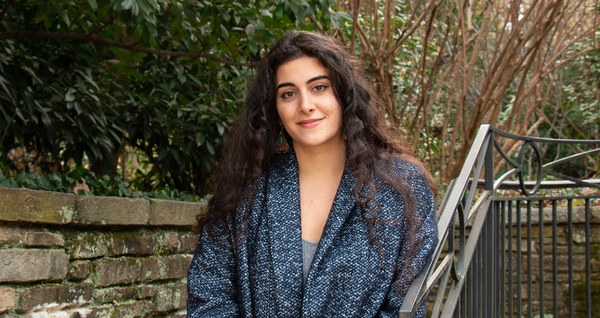Layale Chaker, violinist and composer, was the fall 2021 early-career musician in residence. She offered performances with ETHEL Quartet and her band, Sarafand, and a presentation with librettist and playwright Lisa Schlesinger on their forthcoming opera, Ruinous Gods: Seven Suites for Sleeping Children.
Q&A with Layale Chaker
What is the role of memory and text in your music?
It hasn’t been a conscious decision to focus on memory and language in my music, but I have this omnipresent interest in memory and language, probably because of my life story. My parents were born in Lebanon, forcibly moved from areas to others throughout their childhood and adulthood during the war, and then exiled from the country, and I was born during that experience. We eventually moved back, but then I left—this time willingly—when I was twenty. I’ve always had this tension of the history of my family moving from one place to another and me doing the same but in a completely different context.
My life since that first departure has been a series of departures, and music is my way of having a chronology not related to geography. I rely a lot on my memories, and I hold onto them to feel at home wherever I am. And I have a strong attachment to language in general but also music, which is itself a language, as cliché as it sounds. Wherever I go, I have my language and my memory, and they cannot be taken away from me. I’ve found that in the personal there’s also collectivity—I think we are all increasingly relying on these intangible homes we take everywhere, and I think that’s why they keep reappearing my work.
How did you develop your unique compositional and performance techniques?
I feel it’s important to preserve the authenticity of pure intention in any creative endeavor, and it’s true for the form as well as the content. My techniques have naturally transpired from my different influences and studies. I grew up in the Syriac church, singing its repertoire, and with Arabic music very much part of the daily routine and accompanying different rites of passage. I was also studying classical music, and later I was drawn to jazz and North and South Indian techniques, especially for the violin. So, everywhere I traveled I just kept learning more things, and it sounds silly, but I just love music in general, in the broadest sense of the word. I would transcribe improvisational solos from different traditions and just by looking at them on paper, a lot of it stuck with me and resurfaces when I’m composing or composing in real time, which is what improvisation ultimately can be.
At Dumbarton Oaks, I talked with so many people about so many different things that I thought did not relate directly to what I do, but those conversations ended up nourishing me in one way or another. I resonated with the approach of learning from the past that fellows in Pre-Columbian Studies, for example, share by studying what we can learn from the unsustainability of ancient cultures. For some reason, we also always ended talking about climate change. I never thought I would ever dare to talk about these subjects, but I’ve been lately thinking about the role of art and how people like who are on stage every other night can maximize that hour when people are listening to me, but I just recorded a podcast for WQXR with David Lentz, moderated by John Schaefer, which will soon be available on all listening platforms.
How do these approaches relate to your forthcoming opera with Lisa Schlesinger, Ruinous Gods?
For me, it’s very important that whenever I’m writing something new, I’m looking outwards and forward. I am not attached to my own aesthetic or anything like that—it’s actually quite the opposite. Writing the opera is quite a different experience than improvisation, for example, because composition is such an abstract act of creating—you don’t hear what you did until the downbeat of the first rehearsal, which can be years after you finished the score. But there’s also a unity with my existing work in the sense that it’s still the same person writing with the same influences and history.
The opera is about seven displaced children with uppgivenhetssyndrom (resignation syndrome), a rare trauma response to living in the limbo of displacement, so I’m also aware I’m composing for a story that is not mine. Making an opera is a creative act of connectivity, so I won’t really feel that I achieved my goal until I’m in the same room with the directors, the librettist, the singers, the dramaturg—everybody involved in the production. Usually composing is such a solitary act, and I have yet to see how it will be carried in that collective creativity once we are in production—I might rewrite the whole thing!
May Wang is postgraduate writing and reporting fellow. Photo by Emily Orr, humanities fellow.

